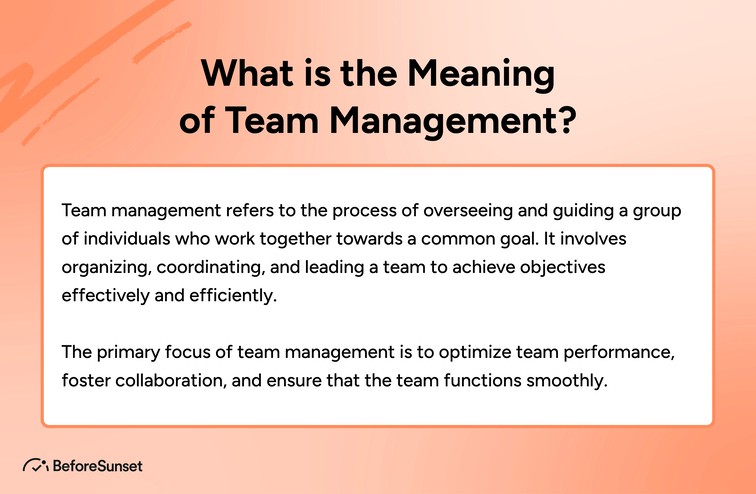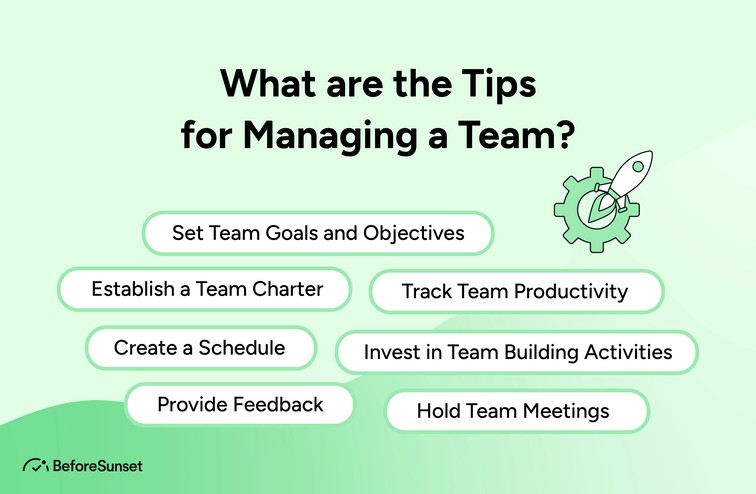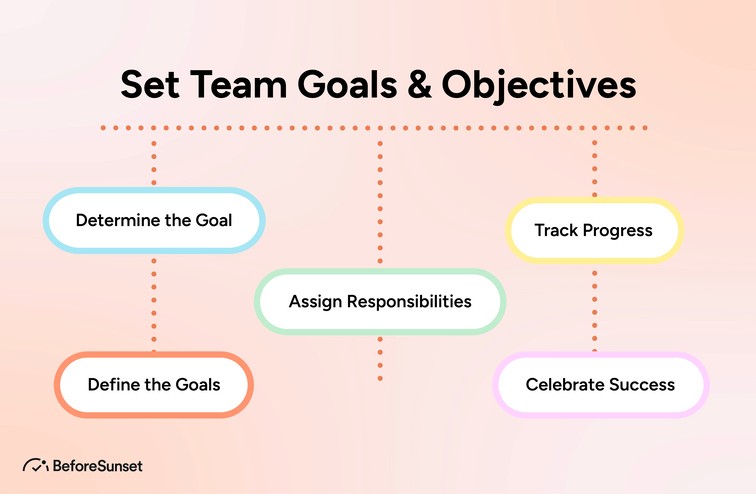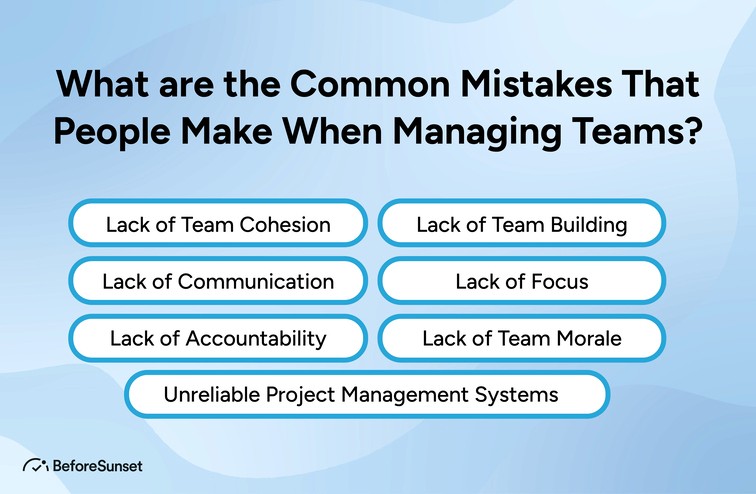“Good teams incorporate teamwork into their culture, creating the building blocks for success.”
-Ted Sundquist
It may be difficult to lead a team, and it takes a certain set of abilities to make sure that everyone is working successfully and efficiently toward the same objectives. The success of the team is your responsibility as a manager, and it is your responsibility to offer direction, encouragement, and support to your team members so they may accomplish their goals.
You must comprehend the dynamics, advantages, and disadvantages of your team if you want to be a successful manager. You must be able to express yourself properly, assign work correctly, and give feedback that encourages improvement.
Additionally, you must be able to manage conflict and come to decisions that are best for the group as a whole. We shall examine the ideal methods for leading a team in this comprehensive manual.
We'll talk about things like decision-making, delegation, motivation, feedback, and communication. By adhering to these principles, you may establish an atmosphere at work where your team members can grow and reach their full potential.
Thus, whether you're a seasoned manager or are just getting started, this guide will give you the skills necessary to be a successful team leader.

What is the Meaning of Team Management?
The practice of supervising and leading a group of people who are cooperating to accomplish a shared objective is known as team management. It entails applying a range of abilities, plans, and methods to encourage efficient teamwork, cooperation, and coordination.
Setting clear objectives and expectations, assigning tasks and duties, offering feedback and support, promoting open communication and cooperation, and resolving internal issues are just a few of the essential components of effective team management.
The main objective of team management is to make sure that each team member can effectively and productively contribute their knowledge and abilities to reaching the desired result.
A leader who manages a team well may create an environment that encourages everyone on the team to grow, be creative, and succeed.
What are the Best Practices for Team Management?
The following are some top guidelines for managing teams:
Establish Clearly Defined Goals and Expectations: Ensure that everyone on the team is aware of the goals and purposes of the project. Establish precise guidelines for each person's obligations, deadlines, and deliverables.
Promote Open Communication and Teamwork: Promote honest communication and teamwork among team members. Encourage the sharing of thoughts, helpful criticism, and various viewpoints.
Assign Tasks and Duties: Assign tasks and duties in accordance with each team member's areas of knowledge and strength. Make certain that everyone is aware of their duties and responsibilities.
Support and Feedback: To assist team members perform better, offer regular support and feedback. Whenever assistance is required, be accessible to respond to queries and offer direction.
Acknowledge and Celebrate Individual and Team Achievements: Recognize and reward individual and team accomplishments. Recognize exceptional work and provide team members rewards for their efforts.
Foster a Positive Work Environment: Create a healthy workplace culture that encourages cooperation, innovation, and respect for one another. Encourage a good work-life balance and offer chances for both professional and personal development.
Manage Conflict Effectively: Promptly and constructively address issues that develop within the team. To settle problems before they become more serious, promote candid and open conversation.
Continue Learning and Improving: As a team manager, continue to learn and advance. To pinpoint areas for improvement, get input from your team and evaluate your own performance.
These best practices may help team leaders establish an atmosphere that encourages everyone on the team to flourish professionally and personally.

What are the Tips for Managing a Team?
Although leading a team can be an enjoyable and fulfilling experience, it also has its share of difficulties. You have the duty of supervising and leading a team of people in the direction of a common objective.
To make sure that everyone is working toward the same goals, this calls for a combination of leadership, communication, and organizational abilities. You must be able to inspire and encourage your team, efficiently assign work, give feedback, and resolve any disagreements that may develop amongst team members in order to manage a team effectively.
To ensure the project's success, you also need to be able to adjust to changing conditions and effectively manage resources. We'll look at some practical advice for leading a team in this section.
These suggestions will address a range of team management topics, such as resource management, delegation, incentive, and feedback.
These suggestions will provide you useful tactics and approaches to aid in leading your team to success, regardless of whether you are a rookie team manager or an experienced one trying to advance your abilities.
1. Establish a Team Charter
Effective team management requires the creation of a team charter. The purpose, objectives, and duties of the team are described in a team charter, along with the expectations and standards for conduct and performance.
Team members can have a clear knowledge of their roles and duties, communication expectations, and performance criteria by developing a team charter.
The charter also outlines guidelines for resolving disputes and serves as a point of reference for the team members throughout the project. The team charter should be reviewed and approved to make sure that everyone is on the same page and working toward the same goals.
2. Invest in Team Building Activities
Making an investment in team-building exercises is a powerful method to encourage cooperation, foster trust, and enhance communication among team members.
Simple icebreaker games to more difficult tasks requiring strategic planning and problem-solving are all examples of team building exercises.
Through these activities, team members can improve their relationships, remove obstacles to communication, and get to know one another better.
Team members can become more aware of one other's strengths and shortcomings by taking part in team-building exercises, which can make them work together more effectively and productively.

3. Set Team Goals and Objectives
Effective team management includes establishing team goals and objectives. Goals and objectives provide the team a clear direction and make sure everyone is working towards the same goals. The steps to setting team goals and objectives are as follows:
Determine the Goal: To begin, decide what the team is there to accomplish. What is the team attempting to achieve, and what is the project's main goal?
Define the Goals: Once the team's purpose has been determined, specific goals that support it may be defined. The SMART acronym stands for specific, measurable, attainable, relevant, and time-bound.
Assign Responsibilities: Each team member should understand exactly what their role is in attaining the team's objectives. This involves deciding who will be in charge of particular duties and outputs.
Track Progress: Keep tabs on how the team is doing in reaching its objectives and make appropriate adjustments. To keep the team on course, this may entail altering the team's objectives, assigning new duties, or giving more resources.
Celebrate Success: It's crucial to recognize the team's successes when it reaches its objectives. This can assist to increase team morale and motivation and give the chance to consider what went well and what might be improved for next projects.
You can give your team a clear direction and ensure that everyone is working toward the same goals by creating clear goals and objectives. This may increase team morale, drive, and output while also ensuring the project's success.
4. Create a Schedule
A crucial component of efficient team management is the creation of a timetable. The team can follow a timetable that details the precise tasks and due dates that need to be accomplished.
Start by listing all the tasks that must be carried out in order to accomplish the team's objectives. Divide these duties into smaller, easier to handle segments.Once all the tasks have been identified, give each one a deadline.
Make sure to take into account the dependencies between tasks as well as any potential delays or roadblocks.
Establish the persons, supplies, and equipment that will be necessary to execute each assignment.Make a thorough calendar outlining the tasks, due dates, and resources needed using a scheduling application. Include backup plans for any potential delays or problems that might occur.
Track the schedule's advancement often and make adjustments as required. To keep the team on schedule, this may entail changing timelines, reallocating resources, or offering more assistance.
5. Provide Feedback
A key component of efficient team management is feedback. Team members may learn from feedback what they are doing well and where they need to improve. Feedback must be given promptly, ideally soon after the action or assignment has been completed. This makes the input more likely to be pertinent and useful.
When giving feedback, be specific about the team member's accomplishments and areas for development. Give specific examples and advice on how they can improve.
Feedback need to be beneficial rather than harmful. Focus on the action or task, not the individual, and give constructive, non-judgmental comments.
Encourage your team colleagues to offer you comments as well. This promotes a culture of open dialogue and ongoing development. Follow up with the team members to make sure they are understanding the criticism and moving toward change.
As required, continue to offer assistance and direction.
You may assist your team members in improving their performance and achieving their objectives by giving timely, precise, and constructive feedback. This may result in increased team success, output, and morale.
6. Hold Team Meetings
Regular team meetings are a crucial component of good team management. Team meetings offer a chance to share pertinent information, talk about objective progress, and address any problems or worries that team members may be experiencing.
Before the meeting, create an agenda stating the subjects that will be covered and any necessary activities. All team members should be encouraged to participate, and a safe and courteous conversation space should be provided.
Bring any pertinent information, including updates, progress reports, and any documents required for discussion, to the meeting. After the meeting, check in with the team members to make sure any actions are taken care of and that goals are being moved closer.
To ensure that team meetings remain fruitful and helpful for the team, regularly assess their efficacy and make any improvements.
7. Track Team Productivity
Monitoring team output is a crucial component of efficient team leadership. Monitoring your progress will help you spot any problems or obstacles early on and make the necessary adjustments. When assessing team productivity, keep the following factors in mind:
Set quantifiable objectives for the group, detailing precise results and due dates. Choose the key performance indicators (KPIs) that will be utilized to monitor target progress.
Follow up on the KPIs and targets often, evaluating performance and identifying opportunities for development using data. Examine the KPI and target outcomes for any patterns or trends that could point to problems or possible areas for improvement.
Make any necessary modifications based on the KPI results and the team's progress toward attaining its objectives.
What are the Common Mistakes That People Make When Managing Teams?
It takes a certain set of abilities and talents to effectively manage a team. Motivating team members, assigning work, defining objectives, and giving feedback are just a few of the procedures that go into effective team management.
Even the most seasoned managers, nevertheless, are prone to errors that reduce team output and overall performance.
In this section, we'll talk about some of the most typical errors that managers make. You may prevent repeating the same mistakes and enhance your team management abilities by recognizing these blunders.
1. Lack of Team Cohesion
One of the most frequent mistakes people make while managing teams is a lack of team cohesion. Teams that lack cohesiveness struggle to function as a unit, which can lead to poor communication, low morale, and decreased production. The degree of cooperation and cohesion among team members is referred to as cohesion.
Teams may lack cohesiveness for a number of reasons. Poor team member communication is one of the most prevalent causes. Lack of good communication among team members can result in misinterpretations, confusion, and a lack of trust.
Additionally, it's possible that team members won't feel comfortable expressing their thoughts or opinions, which can prevent cooperation and the development of creative solutions.
Lack of clarity on team duties and goals can also lead to a lack of team cohesiveness. Team members may become confused and frustrated if they don't know what is expected of them.
Similar to this, if team goals are not made explicit, team members might not be aware of how their individual efforts contribute to the achievement of the overall goals.
Managers should place a high priority on communication, define team members' roles and responsibilities clearly, and promote a culture of trust and collaboration to avoid the error of having a lack of team cohesiveness.
2. Lack of Communication
Another typical error people make while managing teams is a lack of communication. Since communication makes it easier to share ideas, feedback, and information, it is essential for efficient team management.
Lack of communication can cause team members to be confused and frustrated because they may not understand their responsibilities, objectives, or expectations.
There are a number of causes for poor communication within a team. Lack of regular team meetings or check-ins is among the most prevalent causes. Team members might not get the chance to talk about their progress, ask questions, or voice their concerns without frequent meetings.
Lack of trust among team members is another aspect that might cause a communication breakdown. It can create a culture of silence where team members are reluctant to express their thoughts or opinions, which can impede creativity and cooperation.
Managers should prioritize regular team meetings or check-ins, encourage honest communication among team members, and foster an atmosphere of trust and respect if they want to avoid the error of poor communication.
Managers should also make sure that team members have access to the resources and tools they need for productive communication, such as email, chat platforms, or video conferencing software.

3. Lack of Accountability
Another typical error people make while managing teams is a lack of communication. Since communication makes it easier to share ideas, feedback, and information, it is essential for efficient team management.
Lack of communication can cause team members to be confused and frustrated because they may not understand their responsibilities, objectives, or expectations.
There are a number of causes for poor communication within a team. Lack of regular team meetings or check-ins is among the most prevalent causes. Team members might not get the chance to talk about their progress, ask questions, or voice their concerns without frequent meetings.
Lack of trust among team members is another aspect that might cause a communication breakdown. It can create a culture of silence where team members are reluctant to express their thoughts or opinions, which can impede creativity and cooperation.
Managers should prioritize regular team meetings or check-ins, encourage honest communication among team members, and foster an atmosphere of trust and respect if they want to avoid the error of poor communication.
Managers should also make sure that team members have access to the resources and tools they need for productive communication, such as email, chat platforms, or video conferencing software.
4. Lack of Team Building
Another typical error people make when managing teams is a lack of team building. Team building is the process of fostering closer ties and greater cooperation among team members, which may boost motivation, enhance communication, and improve performance as a whole.
There are a number of reasons why a team may not have enough team building. Lack of time or resources allocated to team building exercises is one factor. Lack of connection and lack of trust might result from team members not having the chance to participate in team-building activities.
A lack of understanding of individual differences and talents can also lead to a lack of team building. Team members may get disengaged and unmotivated if they do not believe that their special talents and viewpoints are recognized.

5. Lack of Focus
Another typical error people make when leading teams is losing focus. Focus is the capacity of team members to prioritize their job and stay on target, which can increase output and provide better results.
There are a number of reasons why attention on a team project may be inadequate. The lack of a defined direction or set of objectives is one factor. Team members may lose motivation and attention if they are unaware of the goal they are pursuing.
A failure to be accountable for time management is another aspect that might cause a lack of attention. Team members may be less productive and feel disorganized if they are not held responsible for managing their time.
6. Unreliable Project Management Systems
Another typical error in team management is using unreliable project management software. Systems for project management are essential for making sure that the team is working toward shared objectives and that deadlines are reached.
Missed deadlines, subpar performance, and a lack of responsibility can result from ineffective project management tools.
Project management software might be unreliable inside a team for a number of reasons. Lack of clarity on project goals, deadlines, and expectations is one factor. Team members may lose concentration and operate inefficiently if they are unsure of the goals they are aiming for or what is expected of them.
A lack of sufficient resources or assistance can also lead to faulty project management systems. Team members may experience delays and missed deadlines if they lack the resources or assistance they need to manage their projects well.
7. Lack of Team Morale
Another typical error people make when managing teams is a lack of team spirit. Team morale is a term used to describe how motivated, content, and involved team members are in their job and interpersonal connections.
Low team morale can result in lower output, a lack of creativity, and a greater turnover rate.
There are several factors that might contribute to low team morale. Lack of acknowledgement or gratitude for the effort that team members perform is one factor. Team members may get disengaged and demotivated if they do not felt appreciated or recognized for their work.
A lack of feedback or communication can also lead to low team morale. Team members may feel disconnected and unsure of what is expected of them if they do not often receive feedback or contact from their supervisors or fellow team members.

How Can I Use a Team Collaboration App to Increase Productivity?
By offering a single platform for communication, task management, and collaboration, team collaboration applications may greatly enhance productivity within a team.
Team members may discuss and exchange information in real-time using a team collaboration software, lowering the possibility of misunderstandings and boosting productivity.
The chance of deadlines being missed may be decreased by using task assignment and deadline monitoring capabilities to keep team members accountable and on track.
Co-authoring, file sharing, and version control are examples of collaboration technologies that can make it simpler for team members to work together on projects even when they are in different locations or time zones.
In order to further streamline processes and increase efficiency, several team collaboration applications integrate with other productivity tools, such as project management software or calendar apps.

